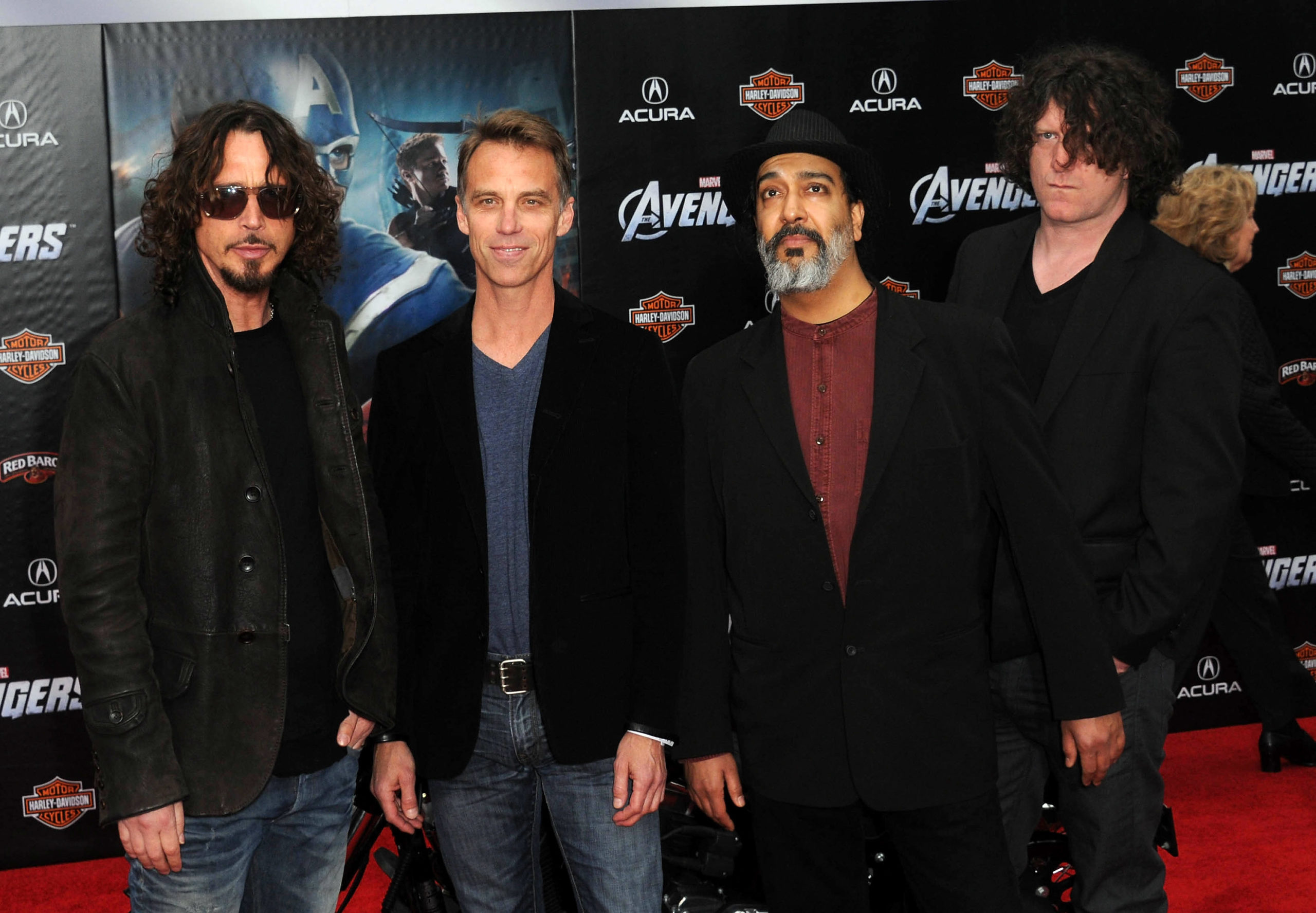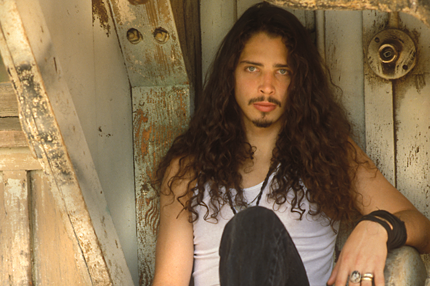Perhaps more than any other song from the early ’90s, Soundgarden’s “Rusty Cage” is emblematic of grunge’s rock-mutt DNA. It was punk spirit tempered with rock-star bravado, metal riffs forged with pop smarts. “Suffice it to say,” SPIN wrote about its accompanying album, Badmotorfinger, in 1991, “whatever awesome heavy rock experience you might have grown up with, you can probably find traces.” Inhabiting the same magnetically arty X-factor that pulsed within contemporaries like Nirvana, Pearl Jam, and Alice in Chains, “Rusty Cage” helped changed the musical and cultural landscape of the ’90s (you can even spot guitarist Kim Thayil rocking a flannel in the video). Soundgarden’s sound was a raw, threatening ferocity that made radio metal seem immediately gauche, but played with arena-ready chops that could beat them at their own game — and you can hear both in frontman Chris Cornell’s fire engine wail.
Immediately following its release, “Rusty Cage” became a bridge between Headbanger’s Ball thrashers and 120 Minutes alternageeks; not to mention wooing the Grammy voting board, who nominated Badmotorfinger for Best Metal Performance. “Rusty Cage” didn’t walk home with a trophy that year, but would be vindicated in 1998, after Johnny Cash sealed the song’s place in the American songbook with his mournful cover on the Grammy-dominating Unchained. The “Rusty Cage” legacy lives on in 2011 as a staple of Soundgarden’s recent reunion shows, which barrel along with a massive arena tour this summer. To celebrate 20 years of “Rusty Cage,” SPIN caught up with Cornell during his ongoing acoustic tour, a journey he’s taking before releasing thefirst Soundgarden album in 16 years.
Where did you write “Rusty Cage”?
I wrote the lyrics in my head when we were in a van somewhere in Europe on tour. I honestly can’t remember where, exactly. But I have a vivid memory of staring out the window, looking at the countryside, and feeling pent-up. I never wrote any of the words down, but I somehow remembered them. When we finished the tour and Soundgarden returned home to Seattle, I picked up a guitar and tried to come up with music that I felt matched the essence of that song. I wanted to create this hillbilly Black Sabbath crossover that I’d never heard before. I thought that would be cool and possible. I thought, “If anyone can do it, Soundgarden can do it.” I was listening to a lot of Tom Waits at the time, and I wondered how Soundgarden could approach similar imagery and I wondered what the music would sound like. “Rusty Cage” is what I came up with.

Also Read
Every Soundgarden Album, Ranked
It sounds like touring in this van wasn’t a very pleasant experience, then, if it inspired lyrics like these — they’re frightening!
It was a very claustrophobic. Soundgarden did a lot of long indie tours from the very beginning. At that point, the pre-Badmotorfinger period, we hadn’t stopped touring from the time we released our first Sub Pop EP [in 1987]. It was all van tours with maybe one crew guy and a big U-Haul filled with gear. It was something that you’re glad to do at 23. There’s something in me that gets very active when stimulation is taken away. I understand how someone who isn’t educated and has never really read will write an amazing book in prison. But I’ve never understood people who say some specific country or place inspired them to write an album. The more antiseptic and stark the studio and the writing environment, the better it is for me. I’ve had good luck writing and recording in sterile, blank environments, because there’s nothing going on. It triggers creativity. That vivid imagery will literally come out of my imagination. There’s nothing else to distract you, which includes drugs and partying or being on a beautiful beach. I’ve tried that [writing music on a beach] but I just sit there and think, “Wow, what a beautiful beach” [laughs]. It didn’t make me want to write music. And if I did it would sound… beachy.
Badmotorfinger was Soundgarden’s first album with bassist Ben Shepherd. What did he bring to the equation?
Ben made our band whole in a way that we hadn’t felt since Soundgarden began. [First bassist] Hiro [Yamamoto]’s absence was something we were living with long before he actually left the band. He was an extremely creative person in the beginning, but that waned quickly. Ben’s creativity was overwhelming and exactly what we needed. We did 100 shows with [onetime Nirvana guitarist] Jason Everman in between Hiro and Ben, and we didn’t have one song or even an idea of a song with him. Hiro had contributed very little to Louder than Love and was so critical of his own musical output that Kim and I had to talk him into doing things that were his idea. Ben, on the other hand, was an outpouring of musical ideas that were all uniquely his and coexisted perfectly with ours. It was when Ben joined the band that I realized, “OK, we’re going to have a future with this. We’re going to make great records.”
How has your perception of the song changed over the past 20 years?
I see it as its own song now. I definitely don’t see it in terms of how it relates to other people’s music, or how it fits in with other music, which I did when I was writing it. I don’t think of that song, or music in general, that way anymore. That’s something a young musician does much more often.
As a young musician writing “Rusty Cage,” what were you thinking about, then?
The challenge for me was, “How can I write a visceral, up-tempo, aggressive, post-punk rock song with screechy vocals, but that’s not a heavy metal song or a retro hard rock song?” It sounds like what we were, which is a band that’s all over the map.
Was “heavy metal” a bad word at the time?
Maybe in terms of what we wanted to play. But not in terms of what we liked. At that point, particularly around the Badmotorfinger period, this huge transition took place where commercial rock music was all bad commercial metal. It ruled the airwaves. It ruled MTV. It ruled record sales. We were trying to steer clear of anything that was going on in commercial hard rock.
Then how did it feel to have Badmotorfinger nominated for the Best Metal Performance Grammy?
We laughed about that. Our first album was nominated for a Grammy in the same category, and we assumed the Academy just invented the category and didn’t know anything about it [laughs]. Like they’d vote for any album that brought some artistry into the heavy metal genre. So we were shoo-ins. We were the first band to get played on both Headbanger’s Ball and 120 Minutes on MTV. It was like, “How is Soundgarden played on a program that also shows a Depeche Mode video?” But it made sense. It was an indication that we were doing things right. We were defying genre and carving out our own niche. So I don’t have a tendency to think, “How does it sit?” anymore. It clearly exists on its own.
Grunge as a whole united disparate genres and fans, and Soundgarden are certainly spearheaded that.
I remember playing a show at bar in Vancouver, BC, in 1986. Mike Bordin from Faith No More was there — I don’t know why, but he was there — and we were firing on all cylinders. We were the absolute best that Soundgarden was at that time. I could feel it. The audience was pinned against the wall looking at us and didn’t have a clue as to what it meant. It was like, “What? An indie rock band with huge riffs that sounds like ’70s rock?” And that was not okay for a band that wanted to fit into the punk rock world! I remember an ashtray whizzing right by my head. It almost hit me in the eye. Just then I thought, “Wow. This is clearly an indication that we’re onto something. We are pissing these people off. They don’t understand it, yet it’s effortless for us.” That was when I knew that Soundgarden was onto something special. We weren’t going to be the only four people in the world that liked it.
How did Johnny Cash get involved with the “Rusty Cage” cover?
It was Rick Rubin’s idea. What he did for Johnny Cash is the best thing he’s done in his career. It would be really difficult to think of another producer that’s done something so important with a person who carries that much weight in pop culture. But when Rick asked me to work up an arrangement of “Rusty Cage” for Johnny Cash, I thought it was a stupid idea. That shows how shortsighted I was. I just didn’t hear it. It didn’t make sense to me. Lyrically, it did. But I was hung up on it sonically. I didn’t know how to turn it into a Johnny Cash song. I spent a couple hours trying and thought it was a waste of time, so I declined to do an arrangement. But later, when I heard the arrangement that Rick had somebody work up on the radio, I felt so stupid.
Ouch.
It was a big lesson for me. It taught me that songs are a lot more nimble than you think. Two days after Johnny Cash’s version hit the radio, I started getting messages on my answering machine from people who’d heard it.
What did they say?
That the lyrics were great! Which was hilarious because nobody commented on how great the lyrics were based on hearing the Soundgarden version, which had been out for years. But the song helped me realize a lot too. When your lyrics are delivered a certain way or by a certain person, it’s almost as if the meaning changes, even though it’s the same words. I had the same experience when I did an acoustic version of Michael Jackson’s “Billie Jean.” I originally did it as a prank on the other three guys in the band, because I’d play a couple acoustic songs in the middle of the set. But when I slowed down the rhythm, figured out the chords, and started singing it, it stared to feel like a lament. It had weight to it. Then I paid attention to what it was actually about.
As a fan, what did Johnny Cash’s cover version mean to you?
I was simply knocked over that Johnny Cash would record a song that I wrote. I remember when my brother brought home At San Quentin when I was nine. We listened to it over and over for about a year. Short of the Beatles covering a song that I wrote, it was the biggest fan experience I’ve ever had.
Soundgarden are also recording their first album in more than 16 years — read more here.




